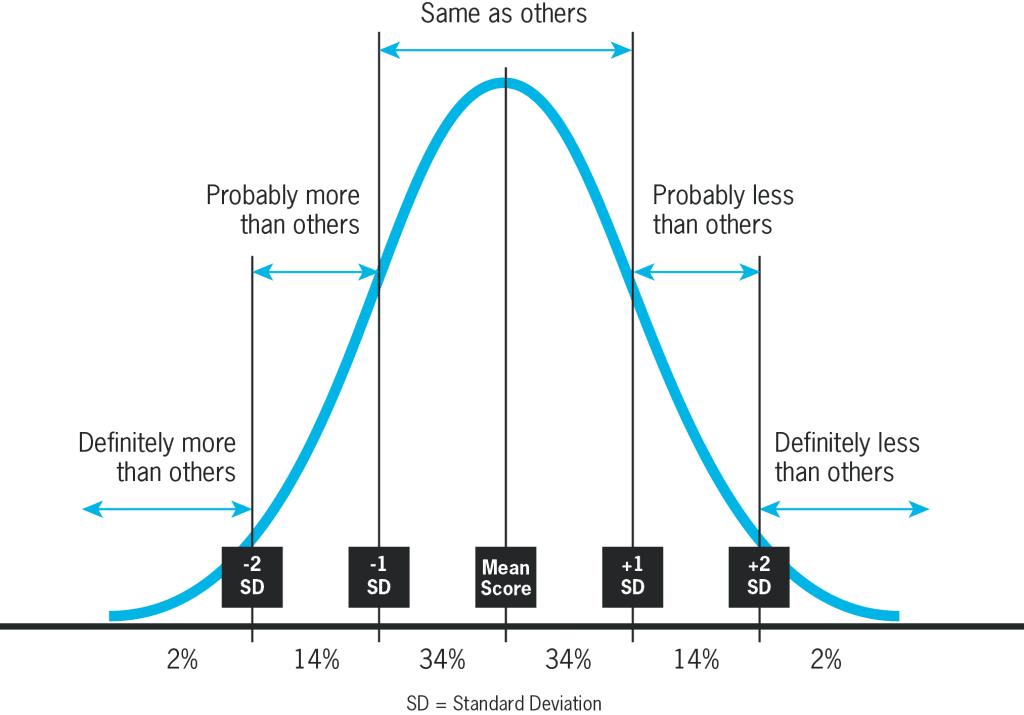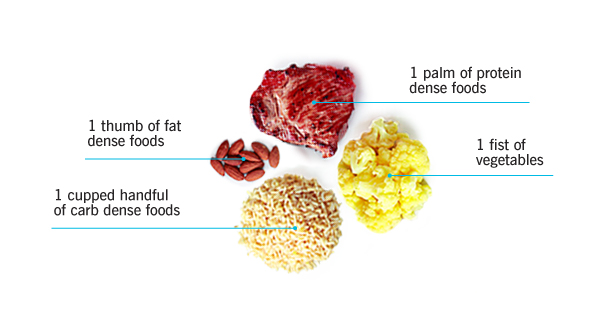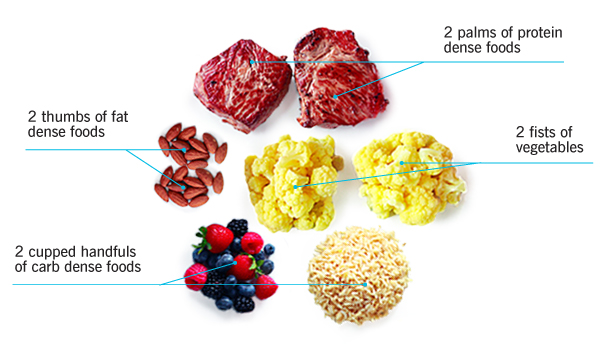Ask almost anyone what they need to do to lose a few pounds, and they’ll probably say: “Cut back on the carbs.” As a nutrition coach, I’ve heard it hundreds of times.
While the low carb movement has waxed and waned in popularity since the Atkins revival of the late 90s and early 2000s, most folks now assume that carbohydrates are inherently fattening.
Health-conscious diners order bunless hamburgers, skip the baked potato side dish, and send the bread basket back to the kitchen. (Or don’t, and feel guilty about it.)
In the past few years, I’ll bet you’ve heard (or thought) at least one of the following:
- Carbs spike your blood sugar and insulin, which slathers on the body fat.
- Carbs, especially sugar and grains, cause inflammation.
- Carbs are not an essential part of the diet like fat and protein.
Seems simple and logical. Which is the problem.
These simplistic statements about “good foods” and “bad foods” ignore biological complexity and the bigger picture.
Let’s look closer.
(Want the hottest nutrition, health, and coaching strategies delivered straight to your inbox? Sign up for our FREE weekly newsletter, The Smartest Coach in the Room.)
Do carbs increase insulin levels?
Yes, they do.
Does increased insulin after meals lead to fat gain?
No.
(Insulin’s actually a satiety hormone — in other words, it makes you feel full — so the idea that on its own it leads to fat gain doesn’t make sense.)
Are carbs really inflammatory?
That depends. Are we talking about processed corn syrup? Probably.
But if we’re talking about whole grains, not really.
Are carbs less important than protein, fat, and the many micronutrients that contribute to our health?
Well, if you’re talking about processed carbs, the answer is a resounding yes.
But if you’re talking about whole, minimally processed carbs, that’s a different story.
Can a low-carb diet work to help people lose weight?
Of course it can.
Is it because it is low in carbs?
Maybe. Maybe not.
Can eating an appropriate amount of carbs actually help you look, feel and perform your best?
You bet it can.
The problem with not eating carbs
As a weight loss strategy, cutting carbs (while reducing the total number of calories) clearly works pretty well for some people. If it didn’t, then Atkins would have never been popular in the first place.
Here’s the thing, though: Carb reduction costs us.
You see, most of us require some level of carbohydrates to function at our best over the long term.
Sure, we can cut carbs temporarily if we need to lose weight quickly. But for most of us, keeping carbs too low for too long can have disastrous consequences.
This is especially true for those of us who work out.
If you’re sedentary, your carb needs are lower. So you might be able to get away with more restriction.
But if you like to exercise regularly and enthusiastically, restricting your carb intake too drastically can lead to:
- decreased thyroid output
- increased cortisol output
- decreased testosterone
- impaired mood and cognitive function
- muscle catabolism
- suppressed immune function.
In other words: Your metabolism might slow, your stress hormones go up and your muscle-building hormones go down.
You feel lousy, spaced-out, sluggish, cranky… and maybe even sick.
Most vexing of all: You probably don’t even lose that much weight in the long term.
If you’re interested in the details and some research, read on. If you just want to know what to do, skip to the end.
Decreased thyroid
In order to function properly and to maintain an appropriate metabolism, our body produces an important hormone called T3. T3 is the most active thyroid hormone and is incredibly important for blood glucose management and proper metabolic function.
Low T3 levels can lead to a condition called euthyroid sick syndrome, in which people are constantly cold and sluggish. (Imagine your metabolic “body motor” idling at a slower speed.)
A landmark study, known as the Vermont Study, found that T3 is very sensitive to calorie and carbohydrate intake. When calories and carbs are too low, your T3 levels drop.
In addition, the Vermont Study found that another hormone, reverse T3 (rT3), is also sensitive to calorie and carbohydrate intake. Reverse T3, as the name implies, inhibits T3.
Getting enough carbs can lower reverse T3. Not eating enough carbs will increase it, thus blocking the important work of T3.
The Vermont Study is far from alone. Other research confirms that ketogenic (ultra-low carb) diets reduce T3 levels as rapidly as starvation.
Additional studies show that when calories are held constant (in this case at 2100 calories), reducing carbohydrates from 409 g to 202 g and then to 104 g significantly reduced serum T3 levels (from 91 to 86 to 69 ng/dL respectively).
Finally, French researchers examined four calorically equal diets (2800 calories in this case), lasting 1 week each. Two of these diets contained 250 grams of carbs, which is a fairly typical proportion. The low-carb diet included 71 grams of carbs, and the high-carb diet included 533 grams of carbs.
T3 levels were equal on the normal and high carb diets (ranging from 163.3 to 169.5 ng/100 mL). However, on the low carb diet they fell to 148.6 ng/100 mL on average. And of course, rT3 correspondingly rose on the low carb diet, but not on the standard or high carb diets.
Thyroid hormones are important for more than just weight loss; they also have profound effects on our overall health and energy levels.
Thus, when you don’t eat enough, and/or eat enough carbs while training:
- T3 goes down
- Reverse T3 goes up, further blocking T3
- You feel like crap, and eventually your training sucks
If you’re active, you need adequate energy and carb intakes for a healthy thyroid.
Cortisol up; testosterone down
Research consistently shows that people who exercise regularly need to eat enough carbs or their testosterone will fall while their cortisol levels rise. This is a sure-fire recipe for losing muscle and gaining fat.
Incidentally, it’s also a marker for excessive training stress.
In a study in Life Sciences, men who ate a high carbohydrate versus a low carbohydrate diet for 10 days had higher levels of testosterone and sex hormone binding globulin, and lower levels of cortisol.
A few years later, another study took this research a step further. This time the subjects included men and women who exercised regularly. And in addition to considering the effect of their diet on hormones, researchers put them through some performance tests.
Once again, when the subjects ate a low carb diet, their testosterone (and other anabolic hormones) went down, while their cortisol went up.
And, after following a low carb diet for just three days, only two of the six participants were able to complete the cycling test! Meanwhile, when following the higher carb diet for three days, all six participants were able to complete the test.
In 2010, researchers reconsidered the same question — this time in relation to intense exercise. In this particular study, subjects eating the low carb diet (where 30% of their calories came from carbs) saw a drop of 43% in their testosterone to cortisol ratio. Not good. Meanwhile, the control group (who got 60% of their calories from carbs) saw no change in their testosterone/ cortisol ratios.
Thus:
- inadequate carbohydrate intake can decrease testosterone (which no one wants); and
- increase cortisol (which no one wants); while
- negatively affecting performance (which no one wants).
Carbohydrates and women’s hormones
We now know that eating too low-carb for too long can cause significant disruptions to many hormones.
This seems especially true for women, whose bodies may be more sensitive than men’s to low energy or carbohydrate availability (perhaps because of the evolutionary importance of having enough body fat and nutrients to sustain a pregnancy).
While organs like our gonads or thyroid make hormones, Mission Control of our hormone production system is the central nervous system (CNS), i.e. the brain.
Our hypothalamus and pituitary glands, which sit in the brain, are exquisitely sensitive to things like energy availability and stress (which can include life stress and exercise stress).
The hypothalamus and pituitary work together with other glands such as the adrenal glands. This partnership is often known as the hypothalamic-pituitary-adrenal, or HPA, axis.
Thus, when women don’t eat enough calories or carbohydrate — or even when women eat enough calories but not enough carbohydrate — they face hypothalamic amenorrhea.
This means disrupted hormones and stopped — or irregular — periods because of the HPA’s response to perceived starvation and stress.
In hypothalamic amenorrhea, hormone levels plummet, and the cascade is felt throughout the system. You end up with low levels of luteinizing hormone (LH), follicle-stimulating hormone (FSH), estrogen, progesterone, and testosterone.
In addition, we’ve already seen that not eating enough carbohydrate tends to increase cortisol levels. When cortisol rises, it signals your HPA axis to further decrease pituitary activity. Not good.
Your HPA axis regulates functions such as stress response, mood, digestion, immune system, libido, metabolism and energy levels.
And your pituitary in particular is responsible for synthesizing and secreting growth hormone, thyroid stimulating hormone, prolactin, LH, FSH and other incredibly important hormones.
With all this said, here’s the takeaway message: Many women try to eat low-carb, wanting to be healthier.
Yet because low-carb diets can significantly disrupt hormone production, women with too-low carb intakes — especially active women — can face:
- a stopped or irregular menstrual cycle;
- lowered fertility;
- hypoglycemia and blood sugar swings;
- more body fat (especially around the middle);
- loss of bone density;
- anxiety, depression, and other mental health issues;
- chronic inflammation and worse chronic pain;
- chronic fatigue and disrupted sleep; and
- a host of other chronic problems…
…ironically, this is the exact opposite of what they wanted in the first place.
Muscle loss
When we think about building muscle, we usually think of protein. But research shows that lowering carb intake can affect your muscle mass even if protein remained constant.
In other words, even if you’re guzzling protein shakes or eating steak 5 times a day, you could be losing muscle if you aren’t getting enough carbs.
A recent study from the Netherlands compared three diets:
- a high carb diet (85% carbs);
- a medium carb diet (44% carbs); and
- a low carb diet (2% carbs).
All diets had the same total calories and the same amount of protein — 15%. (Yes, a little low, but more or less adequate.)
The result? For starters, pretty consistent with other research.
- T3 levels and reverse T3 levels stayed the same with high and moderate carbohydrate intake.
- T3 levels and reverse T3 went down on the low-carb diet.
But here’s the interesting wrinkle. In this study, the researchers also measured urinary nitrogen excretion to see how the diets affected protein breakdown.
In this case, the low carb diet increased muscle breakdown, because severely low carbs lowered insulin levels.
Again, you’d assume that protein intake would determine muscle breakdown. And you might assume — based on what you’ve heard — that having higher insulin is always “bad”.
In fact, insulin is crucial for building muscle.
When you get enough carbs to meet your needs, you replenish muscle glycogen and create an anabolic (building-up) hormonal environment. You get strong and buff. That’s good.
Conversely, when you don’t eat enough carbohydrate, muscle glycogen is depleted and a catabolic (breaking-down) hormonal environment is created, which means more protein breakdown and less protein synthesis. This means slower muscle growth — or even muscle loss.
Putting it all together
The bottom line? Not eating enough carbohydrates can lower T3 levels, disrupt cortisol to testosterone ratios, interfere with a woman’s delicate hormone balance, contribute to muscle loss, and prevent muscle gains.
Definitely not what most of us want!
But wait a minute.
Even if all of this is true, aren’t low carb diets better for fat loss?
And aren’t fat-adapted athletes performing just as well as athletes who eat a lot of carbs?
Low carbs are not better for fat loss
The logic seems so clear and appealing: High carbs lead to insulin which leads to fat storage. Low carbs keep insulin low, which should get you effortlessly lean while you enjoy chicken wings, salmon, eggs, and butter.
Indeed, many people who try low-carb dieting are initially pleased by an immediate weight loss… which is mostly water and glycogen. So, in the short term, it seems like low-carb diets are superior.
But does long-term evidence support low-carb dieting?
Research says no. Over the long haul, any differences between low-carb and other diets even out.
Protein: The hidden success factor
Most studies that suggest low-carb diets are superior suffer from a common methodological flaw: They usually don’t match protein intake between groups. This means that the low carb group often ends up consuming significantly more protein.
We know that getting plenty of protein has many advantages:
- protein has a higher thermic effect — our bodies have to “rev up” to digest it (you’ll know this if you’ve ever gotten the “meat sweats” after a big steak);
- protein makes people feel fuller, longer; and
- protein helps people retain lean mass.
In other words, the big “secret” might be a high protein diet rather than a low carb diet.
So let’s play fair and look at a study where protein was matched. In this study, subjects who ate a moderate carb diet (40% calories from carbs) reported significantly better mood, and lost about the same amount of weight as those on a ketogenic low-carb diet (5% calories from carbs).
Actually, the group who ate a moderate amount of carbs showed a small (though not statistically significant) tendency to lose more body fat as compared to those on a low carb diet (5.5 kg vs 3.4 kg in 6 weeks).
Both diets improved insulin sensitivity. However, the ketogenic diet also increased LDL cholesterol and inflammatory markers and subjects who were on it felt less energetic.
Thus, in this study:
- moderate carb eaters felt better
- moderate carb eaters lost about the same amount of weight, maybe even a little more
- both types of eaters improved insulin sensitivity
- the low carb dieters ended up with worse blood work and inflammation
Makes you wonder why low carb gets so much hype, doesn’t it?
Especially considering that a recent review of long-term low carb versus low fat diets — the largest of its kind so far — found that both low carb and low fat diets reduced people’s weight and improved their metabolic risk factors.
In this review, both diets had about the same weight loss, changes in waist circumference, and measurements of several metabolic risk factors (blood pressure, blood glucose, insulin).
Still, it would be great to understand more about what makes low carb diets “work” at all. One recent study asked: Do low carb diets work because they restrict carbs or because they tend to increase protein?
Over the course of one year, the researchers compared four different conditions:
- normal protein, normal carbohydrate
- normal protein, low carbohydrate
- high protein, low carbohydrate
- high protein, normal carbohydrate.
Interestingly, the two groups eating the high protein lost the most weight.
And the real kicker? Varying the levels of fats and carbs seemed to make no difference to body composition.
Who needs carbs? Who doesn’t?
As our name implies, at Precision Nutrition we don’t believe in one-size-fits-all dietary recommendations.
Like most things, carbohydrate requirements fall on a bell curve.

Most people do best with some carbs.
- About 70% of you will do really well with PN’s standard hand-size portion guidelines. (See our Calorie Control Guide for more.)
- Around 25% of you will do really well increasing or reducing your carb servings by just a little bit. This is what we call eating for your body type, and we outline our recommendations here.
A few people do best with high carbs.
- About 2.5% of the population — people who are ultra-endurance athletes, and a few other outliers — will thrive when eating incredibly high amounts of carbs. (We’re talking ≥ 70% of their total calories).
A few people do best with low carbs.
- In fact, ketogenic diets are actually prescribed for people with epilepsy, as they seem to reduce their symptoms and cut down on seizure frequency. There is also preliminary evidence that ketogenic diets benefit other neurological disorders, such as Parkinson’s disease and Alzheimer’s disease.
- Very sedentary people, as well as people who are extremely metabolically dysregulated (e.g. metabolic syndrome, diabetes), may benefit from a lower-carb diet for a while as part of an overall transition towards more activity and healthier metabolism.
A unique specimen: The low-carb athlete
You might have been wondering about that remaining 2.5% of successful low-carbers.
While rare, these ultra-low-carb people do exist. Even in athlete trials, where the vast majority of participants do better on high carb diets versus low carb diets, you’ll almost always find a few who perform better on a low carb regime.
This study on competitive cyclists offers a perfect example. While the authors concluded that endurance wasn’t generally affected by a high-fat, low-carb intake — at least after athletes became adapted to it — individual responses to this diet did vary enormously.
Two of the five participants got tired sooner when eating low-carb (taking 48 and 51 minutes to conk out, respectively). But one participant actually got better by 84 minutes on the low carb diet.
The data are clear: Each athlete — each person — is unique when it comes to carbohydrate requirements.
While on average the performance of the cyclists did not vary whether they were eating high carb or high fat diets, there was one interesting difference, highlighted by the study authors in a review study done twenty-one years later.
After a week of adaptation to the low-carb diet, most cyclists felt that they could more or less perform normally… except for their sprint capacity, which never seemed to recover while restricting carbs.
If you are a high-performing athlete, this might be especially important to keep in mind. Even in extreme endurance sports, sprint capability can be vitally important. Especially as you’re nearing that finish line.
But before we get too carried away in the opposite direction and start carb loading, let’s remember this basic truth: Most of us are not elite athletes.
So while studies will show that on average athletes tend to perform better with higher carb intakes, this is not a universal rule. There is always individual variability.
What this means for you
Sometimes, we get so caught up in fad diets that we forget to look at the evidence. But fad diets are mostly bad diets.
For many years, we thought the secret to maintaining our weight was to eat lots of carbs and reduce our fat intake. Just think of the old Food Guide Pyramid with grains at the bottom and oils at the top.
Low-fat, high-carb didn’t work for most of us. People felt deprived and hungry; they “cheated” with “fat-free”, high-sugar treats; and they ended up eating a lot of rice cakes.
Then the pendulum swung, people hopped on the low carb, high fat bandwagon, and it was party time with almond butter, bacon, and heavy cream.
Unfortunately for most of us, low carb doesn’t work so well, either.
Strict diets aren’t the answer
If your eating plan isn’t working for you, it’s tempting to make it more restrictive. You might assume that if you aren’t losing fat going kinda low-carb, you should go full ketogenic.
But more restriction almost never works.
Don’t take your nutrition to extremes — unless you have extreme goals.
Strategic moderation, as unsexy as that sounds, is the only sustainable method.
Most of us need some carbs
Most of us will look, feel, and perform our best when we balance a reasonable amount of lean protein, quality carbs, and healthy fats.
Our standard portion size recommendations aren’t just what we think is best. They’re what we know is best, based on careful research and our experience with 20,000 clients to date.


Experiment & have fun
Our recommendations let you be flexible, enjoy the high-quality foods you love, and adjust your intake to your own experience, goals, and unique needs.
Don’t like rice? Fine. Try another carb source.
Don’t like beef for your lean protein? How about eggs?
Need more carbs to support your athletic performance? Cool. Add another few servings and see how it goes.
Curious about balancing your blood sugar by dialing back the carbs just a little bit? Great — give it a go, monitor your glucose levels, and see how you feel.
YOU are unique. Your body is unique.
Your individual carb requirements depend on your:
- goals (fat loss, muscle gain, maintenance)
- genetics (different body types, medical conditions)
- carb source (refined versus minimally processed)
- activity level (sedentary, weight-training, endurance athlete).
Keep it simple
Don’t overly restrict; don’t over-think it; don’t waste time with “carb math”.
Enjoy a wide variety of minimally processed, whole and fresh foods.
Observe how you look, feel, and perform.
Decide what to do based on the data you collect about yourself, not on what you think you “should” do.
The only “rules” come from your body and your experience. Don’t follow a dietary prescription for anyone else’s body.
And above all, for most active people, carbs are your friend!
References
Click here to view the information sources referenced in this article.
If you’re a coach, or you want to be…
You can help people build sustainable nutrition and lifestyle habits that will significantly improve their physical and mental health—while you make a great living doing what you love. We'll show you how.
If you’d like to learn more, consider the PN Level 1 Nutrition Coaching Certification. (You can enroll now at a big discount.)


Share